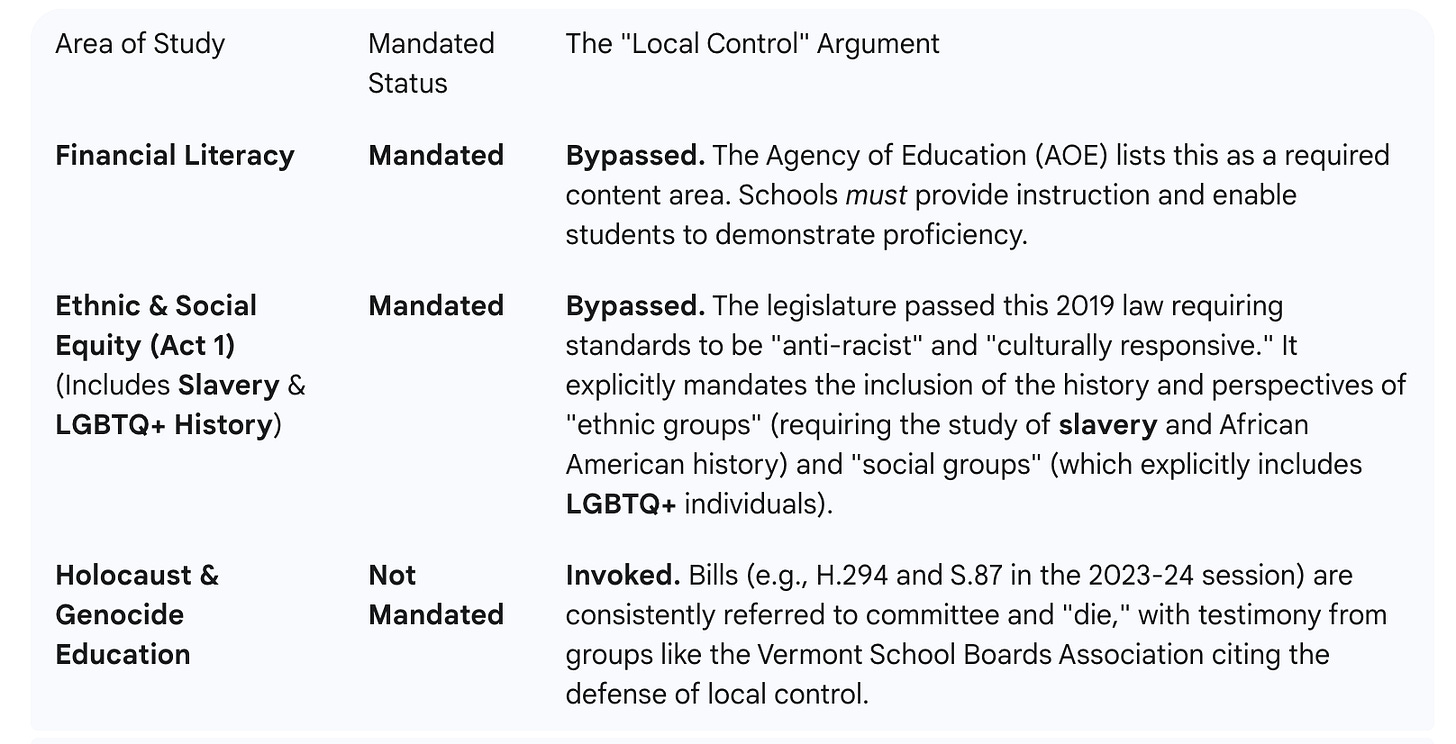Long Before Gaza: Vermont Passed Key Educational Mandates—But Omitted the Holocaust. Why?"
While all of Vermont's New England neighbors have passed Holocaust education mandates, Vermont lawmakers have actively chosen to become the regional outlier.
A Paradox in Policy and Politics
As reported by Compass Vermont, five Vermont lawmakers accepted free, sponsored trips to Israel this year, bringing new attention to the state’s relationship with the Middle East. But this direct engagement with the modern Jewish state casts a harsh light on a long-standing Vermont paradox.
For nearly a decade, the same legislature has refused to mandate that Vermont students learn about the Holocaust—the very atrocity that, for many, defines the modern Jewish experience and the rationale for Israel’s existence.
While all of its New England neighbors have passed such laws, Vermont stands alone. The official reason given for the failure of these bills is the state’s tradition of “local control” over curriculum. But a closer look at the legislature’s own record reveals this defense is a political convenience, not a consistent philosophy.
An Outlier by Choice, Not by Chance
Vermont’s status as the sole New England state without a Holocaust or genocide education mandate is not a long-standing historical quirk. It is a recent and deliberate legislative outcome. The state has actively chosen to become the regional outlier as, one by one, all of its neighbors made the opposite choice.
The wave of mandates in the region began in 2016, when Rhode Island passed its law. Connecticut followed in 2018. Then, in a final flurry, New Hampshire (2020), Maine (2021), and finally Massachusetts (2021) all enacted their own requirements.
During this same period, similar bills were repeatedly introduced in the Vermont legislature. And just as repeatedly, they were referred to the education committees and left to “die”—often without a full vote.
The “Local Control” Contradiction
The “local control” shield used to deflect Holocaust education bills appears highly selective when compared to other educational standards the legislature has imposed.
A review of Vermont’s educational requirements reveals a stark inconsistency. While some topics are deemed essential enough to bypass this tradition, Holocaust education has been repeatedly sidelined.
The “Patchwork” System
This selective use of state power is at the center of the frustration for proponents of a Holocaust and genocide mandate. Advocates like the Vermont Holocaust Memorial (VHM) and the Anti-Defamation League (ADL) argue that the current, non-mandated system has failed.
According to these groups, “local control” has created an inconsistent “patchwork” across the state. Students in one district may receive a comprehensive unit on the Holocaust, while those in a neighboring town may only read a few paragraphs in a textbook, or nothing at all.
The VHM, which provides free resources to schools, argues a state-level requirement is the only way to ensure every student has access to these critical lessons on antisemitism, propaganda, and the fragility of democracy.
Proponents also point to data as a reason for urgency. According to annual reports from the ADL, antisemitic incidents in Vermont and across the nation have been rising, demonstrating a clear and present need for standardized education to combat hate. They argue this topic is just as essential—if not more so—as those the legislature has already seen fit to mandate.
Where Does This Leave Vermonters?
As it stands, what a Vermont student learns about the Holocaust remains entirely dependent on the decisions of their individual school and teacher. The legislature’s adherence to “local control” has been so absolute on this one issue that it has refused to pass even “soft” bills, like H.457 in 2022, which merely asked the Agency of Education to report on the status of Holocaust education. Even that was a bridge too far.
In the 2023-2024 session, H.294 “died” in the House Education Committee, chaired by Representative Kate Webb, while its senate companion (S.87) “died” in the Senate Education Committee, chaired by Senator Brian Campion.
This legislative record makes the “local control” defense difficult to accept as a consistent philosophy. The legislature has already affirmed that it can and will intervene in curriculum to ensure students learn about financial responsibility, the history of slavery, and social equity.
The debate, therefore, is not if the state can mandate educational standards. It’s about why it has repeatedly chosen not to for the Holocaust, leaving Vermonters to question if this specific history is being singled out as a topic not worthy of a statewide guarantee.





It’s because the bill contains a definition of what constitutes “antisemitism “ that conflates standing against Israel’s Government’s policy of occupation, discrimination, torturing and killing of innocent Palestinians as an antisemitic act. Any criticism of the GOVERNMENT of the state of Israel is defined as antisemitism. So we can criticize our government and the governments of every other country on the planet but Israel. If passed as written, it would be a violation of Vermont law to stand against Israel’s genocide underway in Gaza and mistreatments of Palestinians in the West Bank.